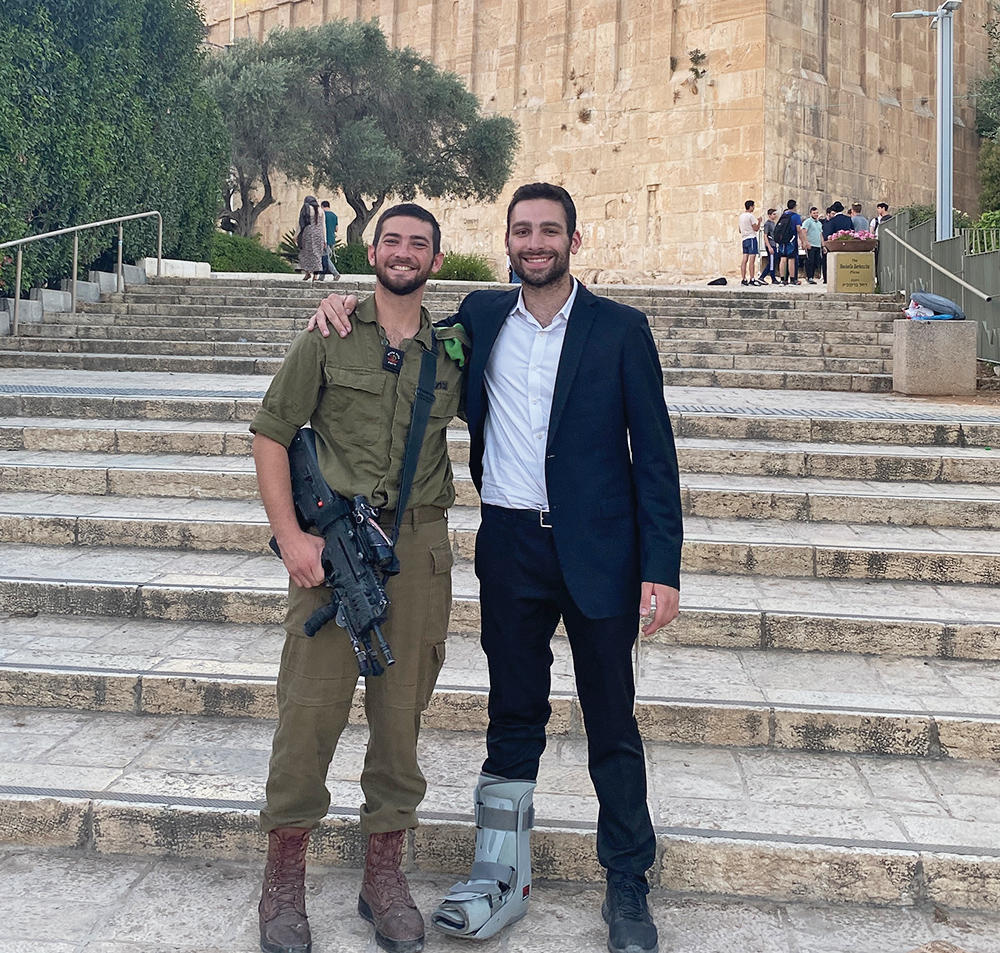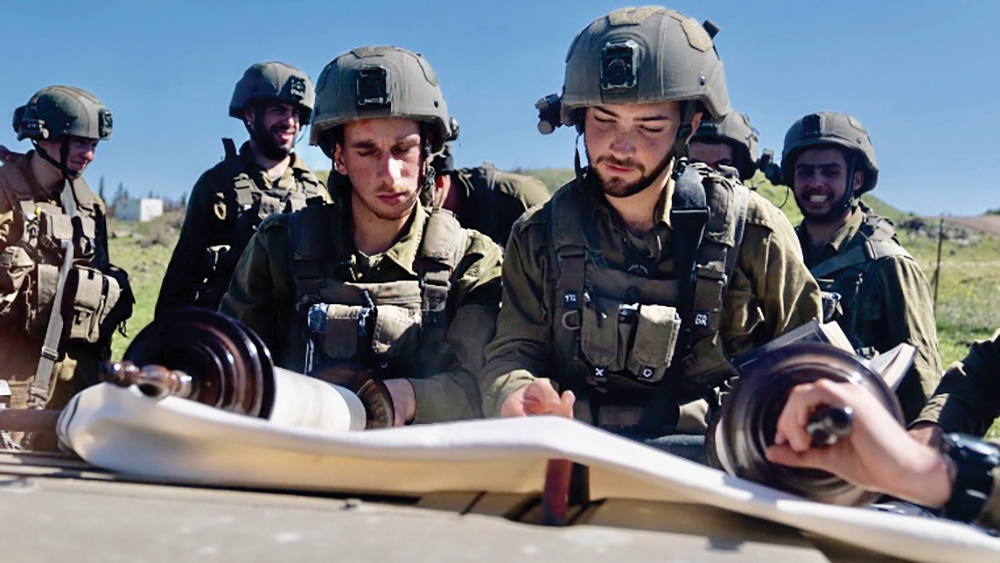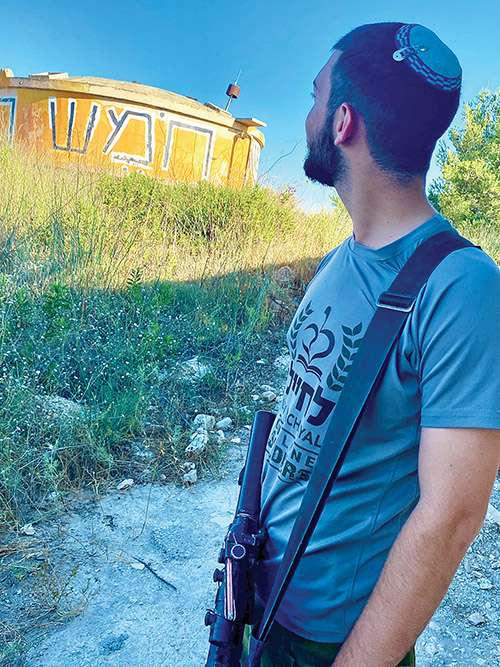
The last day of my IDF service consisted of the usual formalities, procedures, paranoia and degradation. Even on the last day, when commanders could theoretically stop pretending to care that your towel is folded right and the dirt floor is swept, they couldn’t bring themselves to break character. It was a bittersweet feeling that day. I could finally go back to being a “normal person” in the real world. But unlike my experiences with school, camp and yeshiva, which I have always felt a longing to revisit, I couldn’t imagine wanting to come back and continue what I had been doing for the past 18 months, at least on that final day. When I related this to a fellow soldier, he asked me a question: If I could go back in time, knowing how the army was, would I do it again? Given I made the choice to draft, I was asked this question a lot by Israelis and every time, including now, I answered “Of course,” without hesitation.
In the weeks right after I finished my service, I took a lot of time to reflect and address these two conflicting feelings about my time in the IDF. So to answer this question, I’ll give a quick rundown of my service, and point out the most important aspects and events that shaped my experience.
In a typical infantry unit like mine, upon completing training, one is usually sent to join the rest of his unit to partake in operational activities, known as kav, along a border (Gaza, Lebanon, etc.), or in the volatile regions of Yehuda and Shomron (such as Chevron, Jenin, etc.). Kav primarily includes guard duties, patrols, riot control and arrests. Alternatively, soldiers might engage in unit-wide drills and training, referred to as immun, as part of readiness for potential conflicts or wars, ch’v. These assignments are usually set for four-month durations, alternating between kav and immun.
The military deities took a playful turn with my unit, however, leading us on an extensive tour across the country. In a span of just 10 months, our journey encompassed kav duty in Gaza, Jalame, Otniel, Shiloh, Chomesh and Chevron. Meanwhile, our immun training took us from the southern desert of Mitzpe Yericho, three separate ventures to the Golan Heights and many more bases in between. We were in a constant state of movement, never settling in any single location for more than a few weeks at a time.
Just like the army, in any job it’s common to have intense work schedules, unreasonable bosses and arbitrary rules. But what I think is unique about the army, and why I couldn’t picture any desire to go back, is how much of the time I felt apathetic, and here’s what I mean.
The base of my general apathy started with the level of discipline. A person the same age as you or younger is in charge of instilling discipline whenever there’s free time. This includes endless cleaning, making your bed how they feel that day or polishing your shoes even more. You are not allowed to challenge the logic or have an opinion, to the point where they even made a rule that we couldn’t ask “Why are we doing this?”

The decision to commit oneself to combat typically stems from deeply held personal values—the desire to serve one’s nation, safeguard fellow citizens and, for me, the additional religious significance of defending Israel that is within the narrative of our Jewish future. As religious Jews we know, “For Hashem, your God, walks along in the midst of your camp, to rescue you and to deliver your enemies before you…” (Dev 23:15). Most commanders and officers are not religious, and understandably don’t see this mission as Divine, like I do. So while they tolerate it, they mostly view religious accommodations as a hindrance to the overall goal of protecting the country. And from a non religious perspective, they have a strong point. So, particularly for a religious Jew within a predominantly non-religious military framework, conflicts often arise between these core values, and the agendas and egos of higher-ranking officers.
In other words, I was aware from the start that serving would require certain sacrifices—like less learning, fewer social interactions and being away from family. These sacrifices were all justified in the context of pikuach nefesh, saving lives, and serving Hashem. However, I found myself within a system where officers often had ulterior motives, like enhancing their image for higher-ups or winning competitions. Instances like keeping extra people for Rosh Hashanah to practice guarding, or canceling training to prepare for a stretcher race uncovered that many times I was just a mere tool to fulfill their objectives, not Hashem’s. This realization led me to understand that my fundamental beliefs and reasons for being there were being disregarded. I couldn’t ask “Why are we doing this?” as my perspective differed from the officer’s, and the officer’s viewpoint was always correct.
There were definitely many beautiful moments religiously, from Chabad lighting menorah and bringing doughnuts, davening Shacharis and Selichot after all-nighters, singing together at night in the middle of nowhere and everyone hearing Kiddush together Friday night. The IDF also has rules that require giving time to daven, appropriate religious articles for chagim (shofar, menorahs, matzah, etc.) and strict kosher kitchen standards. It sometimes took some pestering and figuring out who’s in charge, but it usually was not an issue.
But if we weren’t completely sharp with our commanders, we were also told at times there’s no time to daven, even though we were just doing drills. These persistent “threats” to keeping the Torah, coupled with the general mundane missions, caused me to lose sight at times at the importance of the work I was doing. When I portrayed my day-to-day job of essentially just guarding sand to my 12-year-old cousin, he simply asked, “Why can’t I do that?” and I didn’t have an answer for him. Most missions did not feel heroic, like the stories I heard of the heroic soldiers who came before me. As a logical thinker, I spent much of my guarding time trying to decipher why IDF soldiers are generally held in high regard in our communities.
In Judaism, action is not sufficient without intent. If one ties tzitzit without the intention of performing the mitzvah, the tzitzit are invalid. In fact, in Brachot 6a it is taught “If a person intended to perform a mitzvah, but due to circumstances beyond his control, he did not perform it, the verse ascribes him credit as if he performed the mitzvah, as he is among those that think upon His name.” This concept, I believe, underpins the deep connection many hold for IDF soldiers. The IDF is iconic for us because it embodies a tangible expression of Hashem’s strength and care for the development and protection of the modern State of Israel, both in the past and present. And even if at times it feels like we could just be guarding sand, every soldier shares that intent to contribute to this Divine purpose, braving through those monotonous-inducing routines, all for the chance to partake in this heroic endeavor. And of course, we’re not just guarding sand.

But this endeavor can not be complete without the total intention of always putting Hashem in front and allowing Him to walk with us. And when I look back I’m proud to say I put on my uniform with a more active sense of purpose: protecting our land for the sake of Hashem and our nation, and had the zechut of doing so in many different areas of Eretz Yisrael.
I can’t argue that the current IDF framework is the most conducive environment for halachic observance. There’s no nevua, prophecy, so we’ll never know if we’re truly doing this right. I see the Chareidi perspective and it definitely has validity. But once I was in the army, I knew I had to do my job and infuse kedusha, holiness, into any circumstance in which I found myself.
I ended up being responsible for all laining for my unit, including weekdays, Shabbos, Megillah, Rosh Hashanah etc. I even had to get combat-support to drive a Torah into the middle of nowhere during weeklong drills. In Chevron, despite everyone doubting me, I vigorously pushed my officers until they finally gave in and set up a system for anyone to leave base and visit Maarat Hamachpela. This was in addition to being part of the minority constantly having to nag for davening time and food before and after fasts. I don’t believe these extra “accommodations” ever significantly affected day-to-day operations. This shift in perspective and purpose, I believe, lies at the heart of the current clashes between religious and non-religious groups that we are witnessing today.
The reality is, sadly, there is a war on religion in Israel. When I asked a Chabad rabbi what he thought about Tel Aviv shutting down tefillin stands a couple months ago in the name of “religious indoctrination,” he quoted the pasuk from Shemot, “But as much as they would afflict [the Jews], so did they multiply and so did they gain strength…” (1:12) And when I look back on my service, I pray that I helped show the higherup officers that religion is not a hindrance, and it shouldn’t just be “accommodated.” When actively and properly incorporated, it brings greater unity, purpose and kedusha for the soldiers—religious and non religious—the army and country as a whole. Hashem can then walk with us in the battlefield, a far more successful tactic than any officer can draw up.
We must realize our responsibility towards Israel and build it up through the lens of Torah. There are many obstacles, but we must not fear resistance from non-religious groups at the expense of fearing Hashem. Whether in the army, sherut or university, there are plenty of places in Israel that need our religious boost. By backing up our prayers and beliefs with correct intention and action, we will see Hashem walking with us not just in battle, but in every part of our efforts to rebuild Israel.
Brian Racer is originally from Teaneck. He served in the IDF as a sharpshooter in the Nachal Brigade and is currently a madrich at Yeshivat Lev Hatorah in Beit Shemesh.








